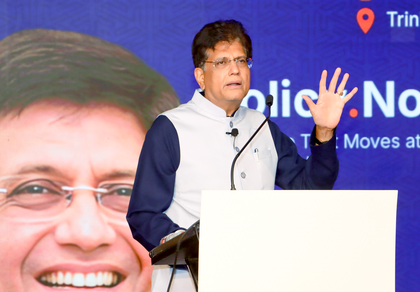India-EFTA free trade pact to come into effect from October 1: Piyush Goyal
By IANS | Updated: July 19, 2025 15:24 IST2025-07-19T15:17:20+5:302025-07-19T15:24:25+5:30
Mumbai, July 19 Union Commerce Minister Piyush Goyal said on Saturday that the Trade and Economic Partnership Agreement ...

India-EFTA free trade pact to come into effect from October 1: Piyush Goyal
Mumbai, July 19 Union Commerce Minister Piyush Goyal said on Saturday that the Trade and Economic Partnership Agreement (TEPA) between India and the European Free Trade Association (EFTA) will officially come into effect on October 1, that would facilitate the creation of 1 million direct jobs in India.
EFTA comprises Iceland, Liechtenstein, Norway, and Switzerland. The landmark pact, signed on March 10, 2024, is likely to unlock huge foreign direct investment (FDI) and deepen trade and economic cooperation across several sectors.
“India-EFTA TEPA to come into effect from 1st October,” the minister posted on X.
EFTA nations have committed an investment of $100 billion, which would help create 1 million direct jobs in India.
A dedicated India-EFTA Desk has been launched to promote trade, investment, and business partnerships. Goyal said the desk will act as a 'single-window platform' for both governments and private companies.
The India-EFTA deal includes $50 billion in FDI within the first 10 years; an additional $50 billion over the next 5 years; and generation of 1 million direct jobs in India.
TEPA marks one of India's most comprehensive trade pacts and is expected to open up premium European markets for Indian exporters while bringing in capital, innovation, and jobs.
As part of the pact, EFTA is offering 92.2 per cent of its tariff lines which covers 99.6 per cent of India’s exports to the region. The EFTA’s market access offer covers 100 per cent of non-agri products and tariff concession on Processed Agricultural Products (PAP). Under the agreement, India is offering 82.7 per cent of its tariff lines which covers 95.3 per cent of EFTA exports of which more than 80 per cent import is gold.
The effective duty on gold remains untouched. Sensitivity related to PLI in sectors such as pharma, medical devices and processed food etc. have been taken while extending offers. Sectors such as dairy, soya, coal and sensitive agricultural products are kept in the exclusion list.
As part of the pact, domestic customers will get access to high-quality Swiss products, such as watches, chocolates, biscuits, and clocks, at lower prices as India will phase out customs duties under the trade pact on these goods over 10 years.
Disclaimer: This post has been auto-published from an agency feed without any modifications to the text and has not been reviewed by an editor
Open in app